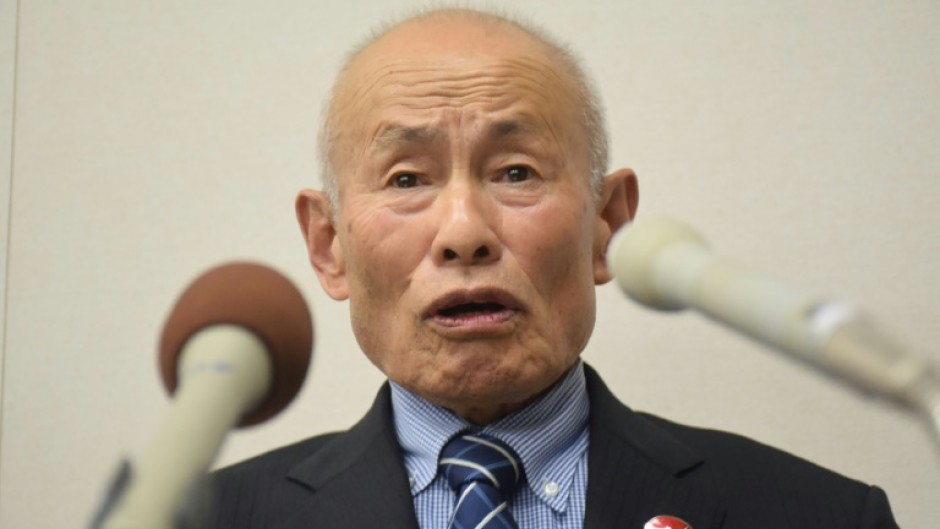STOCKHOLM - A grassroots group of survivors formed after the 1945 atomic bombings in Japan reacted with tears and dire warnings on Friday after winning the Nobel Peace Prize.
The Norwegian Nobel Committee nominated Nihon Hidankyo "for its efforts to achieve a world free of nuclear weapons and for demonstrating through witness testimony that nuclear weapons must never be used again".
Around 140,000 people died when the United States dropped an atomic bomb on Hiroshima on August 6, 1945, and 74,000 others in Nagasaki three days later.
The bombings, the only times nuclear weapons have been used in history, brought to an end World War II and with it imperial Japan's brutal rampage across Asia.
But survivors of the initial blasts, known as "hibakusha", also suffered from radiation sickness and longer-term effects including elevated risks of cancer.
Nihon Hidankyo was formed in 1956, tasked with telling the stories of the hibakusha and pressing for a world without nuclear weapons.
Co-chair Toshiyuki Mimaki broke down in tears at a press conference after the award was announced, saying "never did I dream this could happen".
"It has been said that because of nuclear weapons, the world maintains peace. But nuclear weapons can be used by terrorists," Mimaki told reporters.
"For example, if Russia uses them against Ukraine, Israel against Gaza, it won't end there. Politicians should know these things."
He added that members of the group -- which was founded in 1956 -- were the "average age of 85".
"I hope that the second-generation (of atomic bomb survivors) and the general public participate in peace activities, for peace without nuclear weapons," he said.
The mayor of Hiroshima, Kazumi Matsui, denounced nuclear weapons as an "absolute evil".
"Hibakusha (survivors) are fast ageing and there are fewer and fewer people able to testify to the meaninglessness of possessing atomic bombs and their absolute evil," he told reporters Friday.
"People in coming generations must know that what happened is not just a tragedy for Hiroshima and Nagasaki, but one that concerns all humanity that must not be repeated."
- 'Tragedy of Japan' -
"The fact that the Nobel Peace Prize was awarded to this organisation, which has spent many years working toward the abolition of nuclear weapons, is extremely meaningful," Prime Minister Shigeru Ishiba said.
Ordinary Japanese born after 1945 welcomed the news of the award.
"I think it is very important for such people to convey to the world the tragedy of Japan in the form of the Nobel Peace Prize," consultant Masaki Ozawa told AFP in Tokyo.
"I think it is very important for us Japanese to pass on to the next generation the fact that there is nothing more cruel than war," he said.
Fellow Tokyo resident Keika Ban called the prize a "happy moment".
"As the only country to have experienced the atomic bombings, the best thing for Japan would be for atomic weapons to disappear from the world," he said.
"But now, with the situation in Ukraine and North Korea, the atomic bomb is being used as an intimidation method."
- Gaza -
Mimaki from Nihon Hidankyo also compared the situation of children in Gaza to what Japan faced at the end of World War II.
Palestinian militant group Hamas sparked the Gaza war by attacking Israel on October 7, 2023, killing 1,206 people, according to an AFP tally of official Israeli figures.
Israel launched a massive retaliation campaign, and according to the health ministry in Hamas-run Gaza, the Palestinian territory's deadliest-ever war has killed more than 42,000 people so far, a majority civilians.
"In Gaza, bleeding children are being held (by their parents). It's like in Japan 80 years ago," Mimaki said.
Children in Japan "lost their fathers in the war and their mothers in the atomic bomb. They became orphans", he said.
Nagasaki's mayor, Shiro Suzuki, did not invite Israel's ambassador to Japan to this year's annual ceremony marking the 79th anniversary of the atomic bombing.
He insisted that the decision was "not political" but the ambassadors of the United States and Britain boycotted the event in protest.
On Friday Suzuki welcomed the Nobel award but said it was "overdue", putting the decision down to the "extremely tumultuous" current global situation.
- by Mathias Cena

